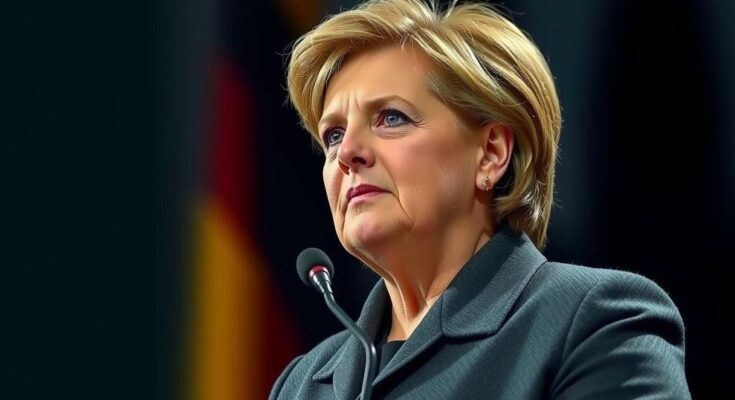As Germany prepares for the February 2025 snap elections, major political parties have nominated their candidates for chancellor. The lineup includes Olaf Scholz (SPD), Friedrich Merz (CDU), Robert Habeck (Greens), Alice Weidel (AfD), Christian Lindner (FDP), Sahra Wagenknecht (BSW), and Jan van Aken (Left Party). Each candidate embodies different political ideologies and societal views, reflecting the complex German political landscape.
In anticipation of the snap elections scheduled for February 23, 2025, Germany’s major political parties have nominated their leading candidates for the chancellorship. These candidates span a range of political ideologies and backgrounds, reflecting the diverse landscape of German politics today. The candidates include Olaf Scholz from the SPD, Friedrich Merz of the CDU, Robert Habeck representing the Greens, Alice Weidel from the AfD, Christian Lindner of the FDP, Sahra Wagenknecht from the BSW, and Jan van Aken from the Left Party.
Olaf Scholz, born in 1958, is the current Chancellor and a member of the Social Democrats (SPD). He prides himself on being a pragmatic leader with extensive experience. Scholz has held positions such as labor minister and finance minister but faces criticism regarding his perceived arrogance and low public approval ratings.
Friedrich Merz, the CDU candidate and the oldest contender in over five decades, was born in 1955 and has a robust background in law and business. Known for his staunch Catholic beliefs, Merz has spent considerable time in private sector ventures, particularly with BlackRock, alongside his previous political experiences in the Bundestag.
Robert Habeck, born in 1969, is the Greens’ candidate. His open demeanor and willingness to acknowledge mistakes have made him relatable to the electorate. Before entering politics, Habeck enjoyed a successful career as an author and translator, which he draws on to communicate government policies effectively.
Alice Weidel represents the far-right Alternative for Germany (AfD) and was born in 1979. Her academic background, including a doctorate in economics, complements her experience in international environments, particularly China. Weidel is notorious for her provocative political style and firm stance against immigration and European integration.
Christian Lindner, born in 1979, is the finance minister and head of the Free Democrats (FDP). Noted for his youthful charisma and social media prowess, he began his leadership role at just 34 years of age. Lindner’s professional history combines a political science education with entrepreneurial experience in advertising.
Sahra Wagenknecht, a prominent figure in the BSW and also born in 1969, has made headlines with her populist approach. She often critiques her peers while showcasing conservative views on social issues and adopting a skeptical stance on climate change and migration policies.
Lastly, Jan van Aken, born in 1961 and a member of the Left Party, combines his scientific expertise with political acumen. Previously a UN biological weapons inspector, Aken has served as a legislator and continues to advocate for the survival of his party within the political arena.
The German political landscape is preparing for a significant shift as the country approaches snap elections amid various social and economic challenges. The candidates reflect diverse party ideologies ranging from conservative to leftist perspectives, emphasizing their individual experiences and policy stances. This election comes at a pivotal time in Germany, as political decisions will play a crucial role in addressing pressing issues such as healthcare, immigration, and economic recovery following global disruptions.
In conclusion, the candidates for the 2025 German chancellor elections represent a spectrum of political beliefs and backgrounds, each bringing unique experiences and strategies to the forefront. As the public engages in the electoral process, the differing ideologies of Scholz, Merz, Habeck, Weidel, Lindner, Wagenknecht, and van Aken will significantly shape Germany’s future direction. The outcomes of these elections will not only influence national policies but also reflect broader societal values and priorities within the country.
Original Source: www.dw.com




